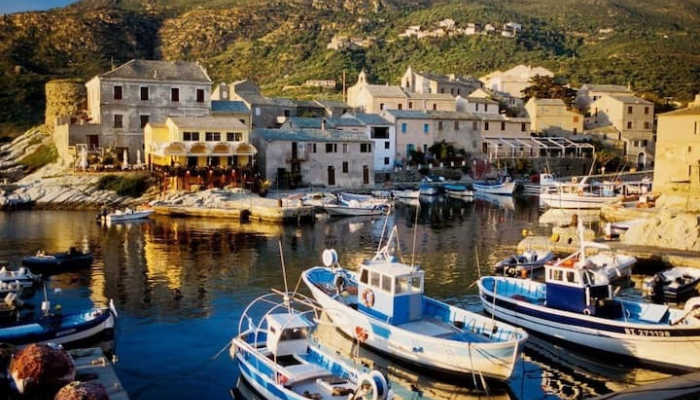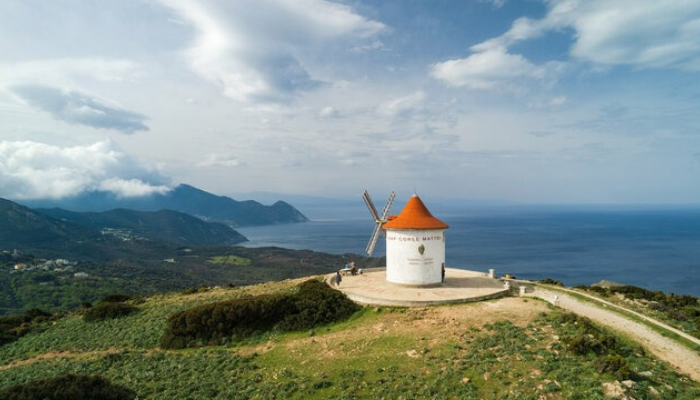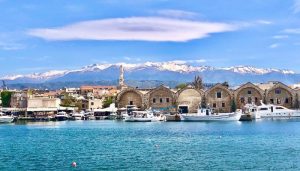
Centuri is mostly defined by its harbor and dining establishments, yet its location and signature dish give it an air of sophistication despite its seclusion
As I dip my feet into the refreshing, crystal-clear waters off the northern coast of Corsica, my only company is a yacht anchored just 100 meters away. While sailing would have been a more glamorous mode of arrival at the port of Centuri, a quaint fishing harbor on the far northwestern tip of Cap Corse, I find excitement in the drive instead.
Navigating the winding lanes etched into the steep hillsides that slope down to the sea, where there’s barely enough space for two cars to pass, is exhilarating. Despite the heart-stopping drive, the scenery is breathtaking. Centuri comes into view as I pause at the Moulin Mattei lookout point, where a terracotta-roofed windmill stands on the former site of the beloved Cap Corse distillery.
I stroll to the viewpoint to admire the breathtaking panorama of the rugged coastline and inhale the intoxicating scent of the maquis—the fragrant shrubland covering the terrain. Below, Centuri’s harbor invites me to approach for a lunch featuring the local delicacy: rock lobster or langouste.
I soak in the stunning view of the rugged coastline and inhale the rich scent of the maquis. Below, Centuri’s harbor calls out to me

Despite its small size, Centuri is known as France’s rock lobster fishing capital, although the fleet has significantly decreased from its peak in the 1960s. At that time, about 20 families engaged in line-fishing the cluster of rocks located 40 minutes out to sea, but now only five families continue this tradition. The practice is strictly regulated to ensure sustainability. Despite this, there seems to be no shortage of rock lobsters, as all of the village’s restaurants offer them on their menus.
Indeed, there is little more to Centuri than its harbor and restaurants. Each restaurant has numerous terraces that cling to the harbor walls, giving the village a sophisticated atmosphere despite its remote location. Perhaps this is the allure of the rock lobster.
I sit at a table at the family-run U Cavallu di Mare (“the seahorse” in Corsican), where the terrace is designed like the prow of a boat, offering a view of the sea wall. Chef Jean-Christophe Strinna emerges from the kitchen and guides me to a tank, where he picks out a rock lobster to demonstrate its lack of large claws, unlike a red lobster. As I make eye contact with my lunch, I briefly contemplate a vegetarian lifestyle. Jean-Christophe then returns to the kitchen to prepare the meal.

Shortly after, his sister Jessica brings my appetizer, soupe à l’araignée (spider crab soup with croutons and rouille). As I enjoy the delicious, tomato-rich soup, I observe a boat entering the harbor while other diners settle in around me. For my main course, I indulge in half a rock lobster, its succulent meat accompanied by crushed potatoes drizzled with peppery olive oil, roasted cherry tomatoes, and a courgette gratin. Armed with the necessary tools, I extract the meat from the lobster’s spindly legs and narrow claw.
For dessert, I savor the island’s signature fiadone, a flan-like cheesecake made with brocciu sheep’s cheese. Afterward, I stroll along the quayside, where nets and buoys are neatly stacked. A brief walk takes me to the water’s edge, where I sit on the rocks, gazing into the azure water, relaxing before the thrilling drive ahead.



